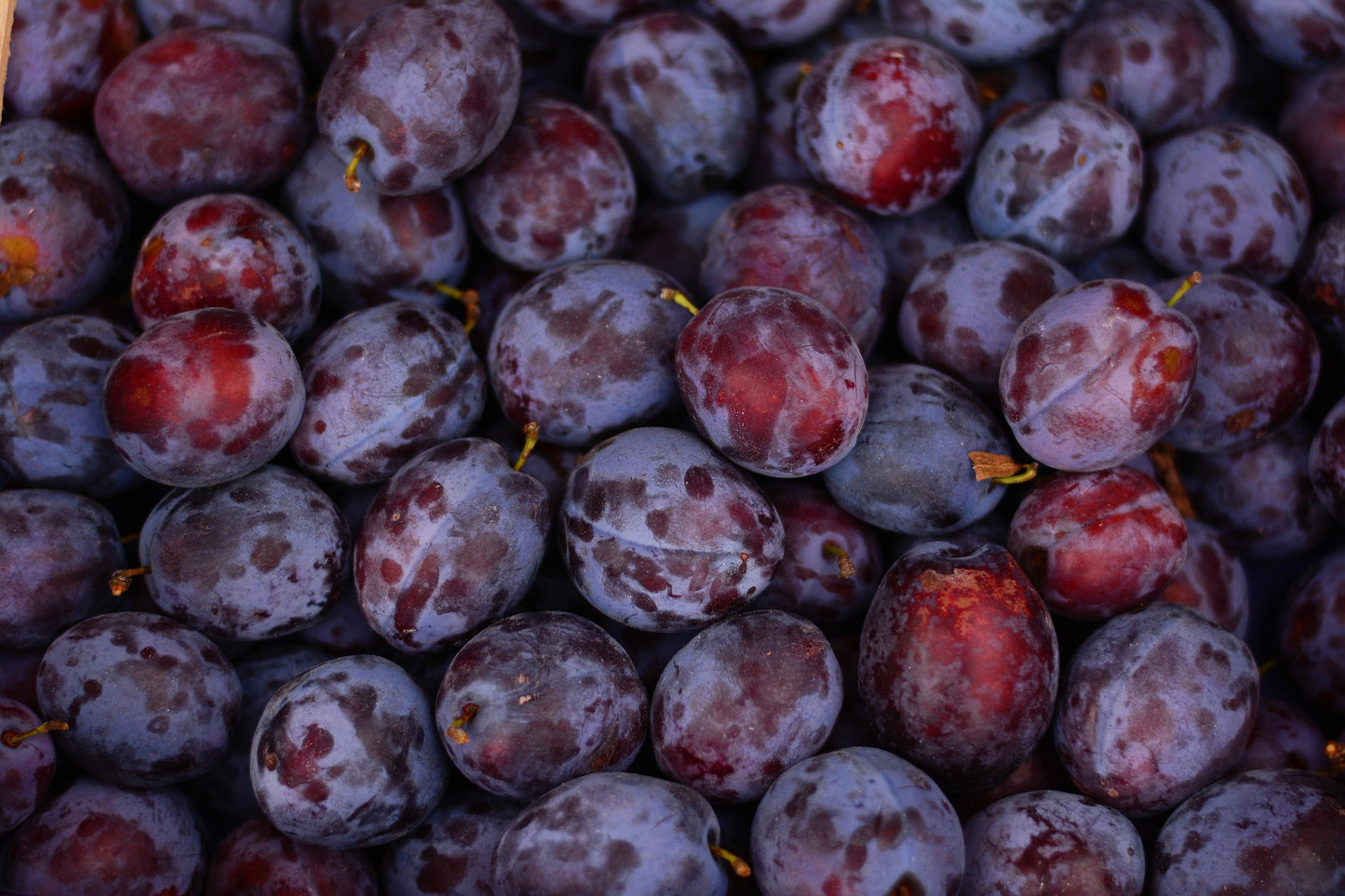-
Delivery from 10 plants to France, Switzerland and Europe
Delivery method -
Fruit Tree Wholesale Supplier
About Us -
Quality Fruit Tree Plants
Technical itinerary
Elephant Heart Plum Scion bare-root
Elephant Heart Plum Scion bare-root
The prices shown are our base prices for large volumes. Depending on the quantity ordered and the producers’ pricing scales, the rate may be adjusted upward. Each quote is personalized to ensure you receive a fair price.
Mini order 10 units / Multiple orders 10 units (FRS202412002)
Couldn't load pickup availability
 Buy now and get it delivered when you're ready to plant - Add your desired date to your quote request
Buy now and get it delivered when you're ready to plant - Add your desired date to your quote request
- Delivery from 10 plants to France, Switzerland and Europe

Technical sheet of the Elephant Heart Plum variety
- Fruit Flesh Color: Firm yet delicate, filled with sweet juice. Sweet floral profile with just a hint of acidity.
- Skin tone: Mottled with pistachio and purple, evolving into a burgundy red with a powdery matte finish
- Fruit maturity: Late
- Fruit taste: Fragrant, firm and sweet flesh, with intense and delicate aromas
- Earliness of the variety: Late, especially for an Asian plum
- Disease resistance and storage: Good productivity and withstands harsh climatic conditions. Short shelf life at maturity
- Variety Yield: Generally quite productive
- Is this variety self-fertile? Although the Elephant Heart Plum is self-fertile, it will produce more fruit if it is associated with a pollinating variety like Golden Japan.
- Commercial Use: Excellent for fresh consumption, but can also be made into jams, cakes, pies, jellies, etc.
- Comments: It is recommended to consume them within a few days of harvest to enjoy their optimal flavor. Requires deep, well-drained soil rich in humus
Quick read / the essentials on Prunier Elephant Heart
The Elephant Heart Plum is a Japanese variety (Prunus salicina) known for its large, heart-shaped fruit , bright red, juicy flesh , and balanced sweetness and acidity . It is an excellent alternative to European plums , especially for growers looking to diversify their offerings with a distinctive, premium plum.
This medium to strong tree , reaching 4 meters in height and width , thrives in temperate to warm climates , requiring about 400 to 500 hours of winter chill for optimal fruiting. It is self-fertile , but sees its production improved by cross-pollination with Golden Japan, Early Golden or Shiro Semi-Dwarf .
The large fruits , with a burgundy red skin when ripe , have a sweet and fragrant ruby red flesh , ideal for fresh consumption, jams and pastries . The harvest takes place between August and September , offering an interesting late marketing to extend the Japanese plum season.
Arboriverse, your specialist plum tree wholesaler , offers you Elephant Heart Plum trees selected and grafted onto Prunus Myrobalan , guaranteeing rapid fruiting and good adaptation to diverse soils . Buying Elephant Heart Plum trees from Arboriverse means choosing a high-end variety, prized for its yield and commercial appeal .
Thanks to its moderate resistance to diseases , this plum tree requires regular maintenance , including gentle pruning and preventive organic treatments against brown rot and aphids . As a specialist wholesale supplier of plum plants , we put our expertise at the service of producers to optimize yields and guarantee superior quality . Buying Elephant Heart Plum plants from Arboriverse means investing in a profitable variety sought after by consumers .
Introducing the Plum Tree Elephant Heart
The Elephant Heart plum tree is a Japanese variety notable for its large, heart-shaped fruit and the exceptional quality of its ruby-red flesh. It is prized by professional growers for its productivity, vigor, and diverse uses for fresh consumption and processing. Adapted to temperate and warm climates, it offers an attractive alternative to traditional European plum trees.
Origin and rusticity
The Elephant Heart plum tree belongs to the Japanese plum group (Prunus salicina). Its exact origin is not clearly documented, but it is widely cultivated in several regions of the world, including France, where it is produced by specialized nurseries. It is well adapted to temperate to warm climates and tolerates moderate winter temperatures.
Its hardiness is estimated between growing zones 5 and 9. It can therefore tolerate moderately cold winters, but requires warm summers to ensure good fruit ripeness. It requires approximately 400 to 500 hours of cold for optimal flowering and fruiting.
Tree characteristics and growing conditions
The Elephant Heart plum tree is a medium to strong tree, reaching 4 meters in height and width at maturity. It has an upright habit, balanced branching, and rapid growth. It generally does not require staking.
It thrives in deep, well-drained, humus-rich soil. It tolerates various soil types, but prefers slightly acidic, well-structured ones. It is recommended to avoid calcareous soils and excessive moisture, which can hinder its growth.
Full sun exposure is essential to promote abundant flowering and proper fruit ripening. Regular watering, especially during dry periods, helps maintain optimal production.
Fruit characteristics
Elephant Heart plums are impressive in size and shape. They are large, heart-shaped, and covered with a marbled skin, evolving from pistachio green to burgundy red when ripe. Their bright red flesh is juicy, fragrant, and sweet, with a slight tartness that balances the flavor.
Harvesting takes place in August and September, making it a relatively late-ripening variety among Japanese plum trees. The fruits do not keep well after harvesting, so it is advisable to consume them quickly or process them.
Production and yield
The Elephant Heart plum tree is self-fertile, meaning it can produce fruit without requiring another plum tree for pollination. However, its production is significantly improved when combined with pollinators such as the Golden Japan, Early Golden, or Shiro Semi-Dwarf plum trees.
Flowering occurs in May and fruiting is rapid. Yields are good and regular, provided that the crop is well managed and the soil is well-suited.
Recommended rootstocks
In France, the Elephant Heart plum tree is generally grafted onto rootstocks such as the myrobalan plum tree, which gives it good vigor, rapid fruit set and adaptation to many types of soil.
Resistance to diseases and parasites
Available information does not indicate any particular disease resistance of the Elephant Heart plum tree. As with other Japanese plum trees, vigilance is required against brown rot, coryneum, and aphids. Regular maintenance, including gentle pruning, controlled watering, and preventative organic treatments, helps limit risks.
Commercial and culinary uses
Elephant Heart plums are highly prized for their flavorful flesh and pleasant texture. They are primarily eaten fresh, but they are also suitable for making jams, jellies, pastries, and even dried fruit. Their high sugar content and slight acidity make them ideal for various culinary preparations.
They are also valued for their nutritional value, particularly their richness in vitamin C, fiber and antioxidants.
Conclusion
The Elephant Heart plum tree is an attractive variety for growers looking to diversify their plum range with a distinctive product, both for its unique shape and exceptional eating quality. Self-fertile but more productive with a pollinator, it requires well-drained soil and regular watering to ensure optimal production.
Its late harvest makes it a commercial asset for extending the Japanese plum season. However, its short shelf life requires rapid marketing or a shift toward processing. With good crop management, it can offer excellent yields and a fruit that is sought after by consumers.
To summarize: Plum Tree Elephant Heart
The Elephant Heart Plum tree is a safe bet for professional growers , thanks to its distinctive fruits, high productivity and excellent taste quality . Its adaptability to temperate and warm climates , combined with a late harvest between August and September , makes it a strategic choice for extending the Japanese plum season .
Its heart-shaped plums , with burgundy red skin and ruby red flesh , are ideal for fresh consumption and for processing into jams, desserts and dried fruit . With a high sugar and antioxidant content , they meet the growing demand for fruits with high nutritional value .
Although partially self-fertile , the presence of pollinators such as Golden Japan or Shiro Semi-Dwarf significantly improves fruit production and size . Its maintenance is moderate , requiring well-drained soil, sunny exposure and light pruning .
Arboriverse, your specialist plum tree wholesaler , offers Elephant Heart Plum trees grafted onto Prunus Myrobalan , ensuring vigorous growth and rapid fruiting . Buying Elephant Heart Plum trees from Arboriverse means benefiting from expert support and a reliable supply .
Whether you are aiming for fresh sales, artisanal processing or export , this variety represents a strategic and profitable investment . As a specialist wholesale supplier of plum plants , we offer you tailored solutions to maximize your yield . Buying Elephant Heart Plum plants from Arboriverse means opting for a unique and high-end plum, perfectly suited to demanding markets .
-
Elephant Heart Plum Scion bare-root organic
Regular price €13,85 EURRegular priceUnit price / per -
Elephant Heart Plum Scion bare-root
Regular price €11,40 EURRegular priceUnit price / per -
Elephant Heart Plum Spindle Tree bare-root
Regular price €15,40 EURRegular priceUnit price / per -
Elephant Heart Plum Half-Standard Tree 8-10 cm diameter bare-root
Regular price €23,70 EURRegular priceUnit price / per -
Elephant Heart Plum Half-Standard Tree 6-8 cm diameter bare-root
Regular price €22,10 EURRegular priceUnit price / per -
Elephant Heart Plum Half-Standard Tree 10-12 cm diameter bare-root
Regular price €25,00 EURRegular priceUnit price / per



